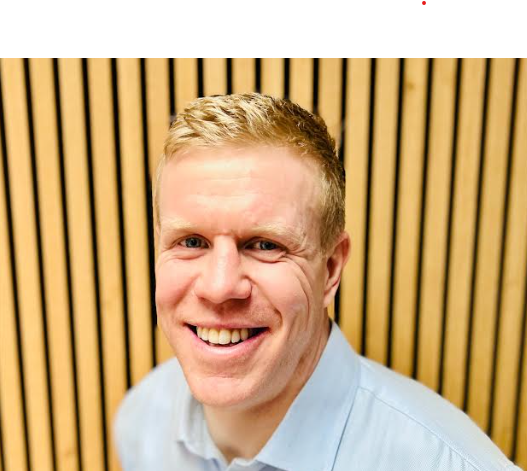Dr Amo Raji has fought against expectations his whole life. Here, he speaks with Melissa Moody about how that motivated him into turning Disability Direct into a multi-million pound charity.
______________________________________________________________
Having listened to him talk at the 2023 Charity Times Annual conference, I knew Dr Amo Raju, CEO of Disability Direct, had an interesting story to share.
Born with cerebral palsy affecting the right side of his body, Raju admits that up until about the age of 24 he lived a ‘kind of mainstream life’, with the only real battle being society’s attitude towards his impairment.
Before Disability Direct became a factor in his life, he was a Bhangra singer with record contracts. “It was a great period of my life where nobody was looking at my disability. They were more interested in the voice and my ability to get people on the dance floor.” But that couldn’t last forever. When the work died down, he found himself with a lack of formal qualifications; twiddling his thumbs looking for a job.
“I found it quite depressing because nobody wanted to know who I was. My disability was suddenly at the forefront again,” and this was before any sort of equalities legislation, so attitudes were vastly different. It was at this point that an employee at the job centre suggested Raju volunteer for a disability charity that had just opened its doors. “I found that quite insulting,” he explains. “Just because I’m disabled, you want me to go and volunteer for a disability charity?” But for lack of better options, he went along. “To cut a long story short, within three years I ended up becoming CEO.”
Taking risks
When Raju’s boss stepped down for health reasons, he was left ‘holding the baby’, so to speak, but simultaneously felt like he had found his purpose in life. “My late boss said to me at the time: ‘you’re angry and frustrated with society, but you’ve had opportunities most of the disabled people out there haven’t… you need to channel that anger and frustration and do it through the charity for the greater good.”
So at 29, he found himself a disabled CEO of a charity with a mostly white user base and board of trustees.
Once he was settled, Raju realised the charity’s funding streams needed to diversify. In the early 2000s, “everybody” was funding them, but at “some stage, this gravy train, it’s going to run out”.
“As a group of disabled people, we want to show the world that we can do it for ourselves, we are equal… as a charity, can we not apply that same principle?” he says.
One of the ways the organisation diversified was by charging for services. Back in those days, it was a fairly new concept and a taboo one too – overnight he lost about three trustees, Raju admitted, so the pressure was on for things to go right.
At the time, legislation was changed so disabled people could start employing their own care staff, but it also meant that they had HMRC obligations. Raju saw that accountants were charging over £1,000 a year, and realised the organisation could offer the same service for around £100 a year, whilst still making a profit. Quickly 50 customers turned into 200. It now has over 2,500 customers 20 years on.
“It was brilliant that this was unrestricted funding coming into the charity. I could spend it where I needed to without having to run to funders.”
Now the organisation has a number of other enterprises, including the access card, which put over £250,000 back into the charity. This year, the turnover is estimated at about £2.5m with 95% self-generated.
Even with this success, there’s some organisations that see charging for services “as a swear word.” A big reason why Raju has been able to implement this model, however, is due to the level of trust from his board.
“I see too often where people become trustees because they want to do good, but then if they get to the stage where they’re interfering and micromanaging senior management, then the staff get confused as to who the real bosses are and you’re diluting the energy that is there at the top to drive change forward.”
His own board is made up of 75% of disabled people with lived experience, so he welcomes board scrutinization and challenges, but there’s no need to get involved in day-to-day work, Raju believes. Sometimes lines need to be drawn.
That’s not to say that sometimes expertise isn’t needed. “I’ve got solicitors on my board; I’ve got accountants and they’re there not because I’m ticking a box, they’re there because they know more than I do.” The same applies to Raju’s directors: they are employed, he emphases, because they compliment his skillset.
Managing the highs… and the lows
The length in the role means that Raju has experienced a number of ups and downs. One of the biggest challenges has been managing growth, particularly when it’s happened at an exponential rate. The organisation is an ambitious one. I had a crash course in understanding the role of the charity, of making sure we stayed within our parameters.”
As the organisation grew, they absorbed struggling projects – at one point going from 11 staff to 40 overnight. With that brought changes and Raju quickly realised he couldn’t be responsible for the HR for 40 people, learning that the organisation would have to be realistic about the work taken on.
But being realistic doesn’t mean the achievements are few and far between. The biggest achievement, Raju believes, is that the charity is still here today. “When I started here, back in 1994, my boss said to me: ‘we’ve probably got a year or two as a charity’” At that point, they were simply a signposting service, and Raju helped to bring in advocacy and advice. “It’s the only surviving service from the early days.”
With the longevity of his role, comes the question of succession. The name ‘Amo Raju’ is so closely intertwined with Disability Direct that it would take an age to unwind the threads. “[The board] have said I’m an asset, but I’m also a great risk.” Because he’s been in the role for so long, stakeholders are comfortable knowing that. One individual even said that when he leaves, the value of the charity drops to zero.
Knowing that, it would be a difficult decision to leave, but it’s something that needs to be planned for – plans of which are in the works. With the release of a book he’d written during lockdown (Walk Like a Man: From Limited to Limitless), he began being pulled in other directions and his own ambitions mean he can’t stay with the charity forever.
Looking ahead
The success for Raju and Disability Direct means the future is looking positive. He has been recognised for his work with a number of awards: featuring in the top 100 on the disability power list; a lifetime achievement award at the ITV News National Diversity Awards; and an honorable doctorate for his services to the voluntary sector and disabled people.
His trustees recognise this too; encouraging him to be a role model. “When I grew up, I had no one to look up to as a disabled person, and disabled children need to see what can be achieved.”
Raju is proof that people can defy expectations. In 1993, there were people who wanted him to attend a day centre; 11 years later he signed the contract to take it over. That’s just one example, but “there’s dozens” he explains, that show the lack of belief in disabled people. “The sad thing is, it’s still around today.”
Many people in Raju’s position might be tired. His journey so far has been hard, long and at times, extremely challenging. Yet, despite all this, he shows no signs of giving up any time soon. “My hair has gone grey and I’m taking more paracetamol than I used to… but I can spread the word about what can be achieved and hopefully inspire the next generation of voluntary sector and business leaders and disabled people”.
Latest News
-
Charity to close after 40 years due to ‘harsh realities of funding challenges’
-
‘Financial strain’ forces monkey sanctuary charity to close to the public this year
-
Refugee charities coalition names next chair
-
Pregnant Then Screwed appoints new CEO
-
Knowledge gaps impacting legacy fundraising, research shows
-
Design agency launches pro bono scheme for charities
Charity Times video Q&A: In conversation with Hilda Hayo, CEO of Dementia UK
Charity Times editor, Lauren Weymouth, is joined by Dementia UK CEO, Hilda Hayo to discuss why the charity receives such high workplace satisfaction results, what a positive working culture looks like and the importance of lived experience among staff. The pair talk about challenges facing the charity, the impact felt by the pandemic and how it's striving to overcome obstacles and continue to be a highly impactful organisation for anybody affected by dementia.
Charity Times Awards 2023
Mitigating risk and reducing claims

The cost-of-living crisis is impacting charities in a number of ways, including the risks they take. Endsleigh Insurance’s* senior risk management consultant Scott Crichton joins Charity Times to discuss the ramifications of prioritising certain types of risk over others, the financial implications risk can have if not managed properly, and tips for charities to help manage those risks.
* Coming soon… Howden, the new name for Endsleigh.
* Coming soon… Howden, the new name for Endsleigh.
Better Society

© 2021 Perspective Publishing Privacy & Cookies











Recent Stories